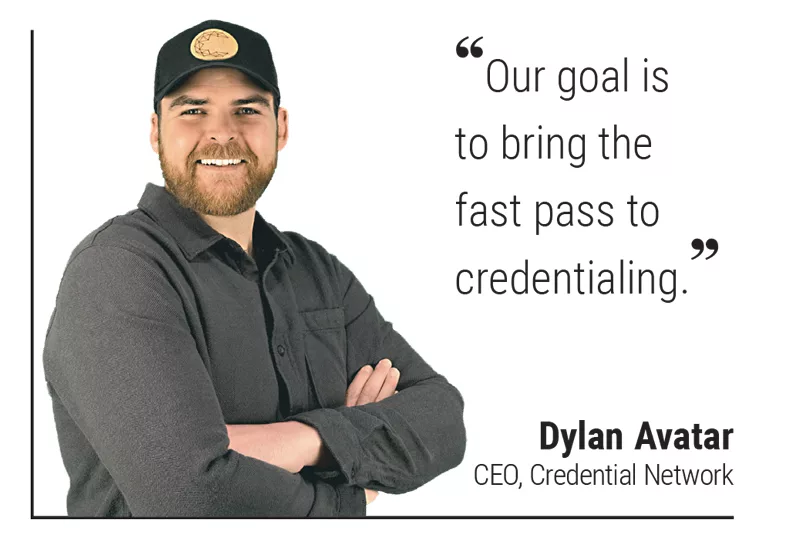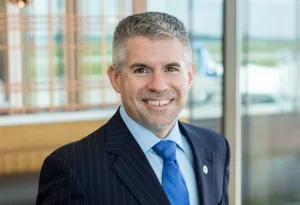
Startup builds tool to streamline health care credentialing
Credential Network aims to fix delays in process

Spokane-based health tech startup Credential Network Inc. has secured a $250,000 grant from the Health Sciences & Services Authority of Spokane County to expand its team and establish its headquarters in the region.
Founded late last year, the company is developing software that aims to streamline the credentialing process for health care professionals, a cumbersome yet essential process in ensuring that medical staff meet the standards set by regulatory bodies, insurance companies, and health care institutions.
Dylan Avatar, founder of Credential Network, says that with the HSSA grant, Credential Network plans to grow its Spokane-based workforce and deepen its ties to the region’s innovation ecosystem.
“Our goal is to bring the fast pass to credentialing,” Avatar says. “We don’t want to bypass credentialing. We want to streamline it and in doing so, give people higher trust in the providers who are going through it because we’re utilizing intelligent technologies to help build these profiles.”
The company is currently beta testing its software tool and has seven beta clients based in the Pacific Northwest. Avatar anticipates to launch the software sometime in the third quarter of this year.
The medical credentialing process faces several challenges that make it difficult and lengthy for health care professionals to verify their qualifications and competence, Avatar contends. Such challenges often include redundant paperwork, manual data entry, and long approval times.
Credential Network’s platform aims to centralize and automate this process, offering a digital interface for credentialing specialists and a secure digital wallet for providers to manage their own credentials, he says.
The goal, he adds, is to speed up onboarding without compromising on safety or compliance, a process he and his team believe is possible through intelligent design and secure technology.
Credential Network is led by Avatar, alongside co-founders’ chief business officer Jeff Falconer, and chief technology officer, Thomas Boyles. Their team includes two full-time staff members and contractors. Two additional team members are also in the process of relocating to Spokane, Avatar notes. The company plans to have at least seven Spokane-based employees within the next six months, pending additional fundraising. The company is also supported by a group of health care and credentialing advisors who help guide and ensure that Credential Network’s tools are aligned with their mission while also meeting the needs of health care professionals.
The company operates on a hybrid model, utilizing local coworking spaces like Fuel, the downtown coworking space launched by Cowles Ventures, the venture capital arm of Cowles Co., and working remotely from home.
While Spokane is laying the foundation for the company’s eventual headquarters, Credential Network has its eyes set on national reach, Avatar says.
“We’re listening to our clients, and we’re listening to the industry and we’re developing new features and functionality by the day,” he says.
The Credential Network founders bring a mix of technical and industry-specific expertise. Avatar previously worked for and was part of the team that founded California-based digital credentialing platform Merit, which offers digital credentialing services for large-scale government programs. Falconer has over two decades of experience in medical software and government sales. Boyles brings decades of experience leading teams in medical technology.
The idea for Credential Network began to take shape during an unexpected chapter in Avatar’s life. In December 2023, Avatar was seriously injured in a wingsuit base jumping accident that left him hospitalized for six weeks. While his physical recovery was demanding, it also offered him the opportunity to learn more about the inner workings of the health care system.
“I couldn’t really lift my arms, but I could ask questions,” Avatar says. “So I spent a lot of time understanding the different perspectives of the health care providers.”
Drawing on his experience in digital credentialing and verified identity, he began to have conversations with the people aiding his recovery about the health care credentialing process. What he heard was consistent: it’s a critical, highly regulated system, but one that is still manual and often a source of major delays.
“To quote one of our first things I heard was ‘it’s a constant headache,’” Avatar says. “And that’s been mirrored within the dozens of provider conversations and administrator conversations we’ve had.”
Avatar’s accident happened in Arizona, and he was initially treated there, but eventually returned home to Spokane for multiple follow-up surgeries and a long course of physical therapy. During his physical therapy journey, Avatar developed a close relationship with Brian Cronin, owner of U-District Physical Therapy & Institute of Sports Performance and an adjunct professor at Whitworth University. Cronin would go on to become a trusted advisor to Credential Network, providing initial feedback on their platform to ensure the company was building something valuable and viable for health care businesses like U-District Physical Therapy.
After his recovery, Avatar returned to his remote job at Merit, but his near-death experience had changed his perspective and his priorities. After some time, he left amicably and took some time to think about what he wanted to do next, and decided he wanted to work in the medical space in some form.
“I just started putting a lot of time and focus into things that I think matter,” Avatar says. “I did go back to my last company, and I helped them for a little, but I knew my true calling was to come and help the medical space. I just felt indebted.”
Avatar launched Credential Network remotely from his home in Spokane, with his dining room table as the centerpiece where he and his partners would lay the foundation for their new startup. He then dove into the startup, innovation, and tech scene in Spokane and found a community that cared about innovation, coupled with a healthy amount of mentorship, he says.
As time went on and he considered moving from a remote model to a hybrid model, or possibly establishing a brick-and-mortar headquarters, Spokane seemed like the perfect combination of creative, innovative leaders and players set within a strong health care community.
For Avatar, Credential Network was born out of a newfound passion and purpose to root his life into the things that matter, he says.
“It’s all being inspired heavily from my accident,” Avatar says. “Everything I’ve been doing, ever since the accident, has a tremendous amount of intentionality behind it. I’m so stoked to be alive, and every day I just carry that energy forward.”


_web.webp?t=1769673727)
_web.webp?t=1769673728)
_web.webp?t=1769673735)
